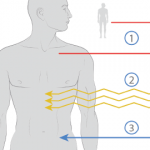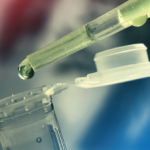Complications from autologous transplantation for autoimmune disease can include treatment-related deaths, cancers and infections. The SCOT trial had a transplant-related mortality rate of 3% at 54 months and 6% at 72 months after randomization.
Future for Stem Cell Therapy & Scleroderma
Dr. Sullivan’s colleagues have some insights into the mechanism behind the therapy’s success. Shervin Assassi, MD, MS, of the University of Texas, Houston, will present the results of the SCOT trial at the upcoming Systemic Sclerosis World Congress in France. Early findings suggest that by 24 months after randomization, the genomic molecular signatures of scleroderma are normalized in the patients who received a transplant, but not in patients treated with cyclophosphamide. These data suggest stem cell therapy has the potential to renormalize the autoreactive immune system.
The U.S. has more than 200 hematopoietic stem cell transplant centers, seven of which participated in the SCOT trial. The investigators from the SCOT trial are reaching out to other centers to share techniques and protocols. In this way, transplant physicians are striving to make the stem cell treatment available to all patients suffering from scleroderma with internal organ involvement.
Dr. Sullivan also anticipates the future of stem cell therapy for patients with scleroderma. “I think our next step could be broadening the entry criteria,” he explains. Consideration is being given to including individuals with high risk, rapid and progressive-onset, skin only involvement, who were not included in the SCOT trial. From his discussions with patients, Dr. Sullivan believes that these individuals would also welcome the option of stem cell therapy.
“Physicians sometimes think they know what patients will accept in terms of risk, but may sometimes be mistaken,” he muses. Scleroderma can be debilitating and deadly and many patients would embrace an effective new treatment option.
Lara C. Pullen, PhD, is a medical writer based in the Chicago area.
References
- Sullivan KM, Goldmuntz EA, Keyes-Elstein L, et al. Myeloablative autologous stem-cell transplantation for severe scleroderma. N Engl J Med. 2018 Jan 4;378(1):35–47.
- Burt RK, Shah SJ, Dill K, et al. Autologous non-myeloablative haemopoietic stem-cell transplantation compared with pulse cyclophosphamide once per month for systemic sclerosis (ASSIST): an open-label, randomized Phase 2 trial. Lancet. 2011 Aug 6;378(9790):498–506. doi: 10.1016/S0140-6736(11)60982-3. Epub 2011 Jul 21.
- van Laar JM, Farge D, Sont JK, et al. Autologous hematopoietic stem cell transplantation vs intravenous pulse cyclophosphamide in diffuse cutaneous systemic sclerosis: A randomized clinical trial. JAMA. 2014 Jun 25;311(24):2490–2498. doi: 10.1001/jama.2014.6368.

